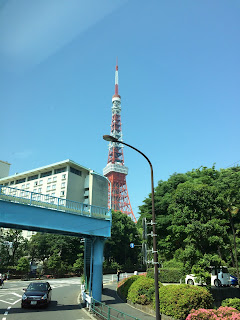Those of you who know me or have read the blog for a while
know I’m a monster fan at heart. You’ve
probably been asking yourself why it’s taking me so long to address Godzilla in
all of these posts about visiting Japan.
Well the fact is, he’s more difficult to find than you’d think. Sure, you’ll see him in the occasional
gachapon machine and you can find toys in most decent toy stores, but there’s
no Godzilla museum or even a decent exhibit in a Toho theater. Instead, you have to travel around and check
out multiple sites that have a few things here and there.
First up, you can visit the Toho theater in Shibuya. On the third floor, you’ll find the original
Gojira statue that used to sit outside in a courtyard area. As you can see, it’s kind of small given the
subject matter, but it’s a cool statue nonetheless.
It was moved here after it was replaced by this statue in
that same courtyard. This version is the same one seen in the excellent Shin-Gojira that was a huge hit in
Japan in 2016. It’s bigger than the
original but still, it’s not Godzilla-sized and it's just a statue in a courtyard.
What you really want to see is something big, crazy and
loud, right?
There’s only one of those and it’s in Shinjuku. That’s right, the same Shinjuku that I described
last week as a little on the shady side.
The Hotel Gracery partnered with Toho in constructing a giant Gojira
head and claws on its roof.
Even from a
distance, it looks like he’s about to come right over the building. It’s located (conveniently) on Godzilla street.
Take the elevator up to the lobby and you’ll be confronted
with this awesome display featuring every single Toho Gojira movie poster in
chronological order, from the original all the way through Shin-Gojira.
Then, you can walk out onto the roof and see
the big guy up close and personal.
The
base features famous scenes and an area where you can activate a low roar and sound effects. The real treat is to be there when the giant
head comes to life. Steam and lights begin pouring from its mouth and it lets
out with a very loud roar!
Once you’ve finished looking around, if you still want a little
more Gojira related fun, head to the hotel’s café and you can order a themed
dessert. I can’t vouch for them because we weren't hungry, but the main one is meant to resemble elevated train tracks and I’m
sure playing with your food in this situation would not be frowned upon.
These are the major Gojira attractions in Tokyo proper,
however there are others outside the area that we didn’t get to.
For instance, there’s the giant slide at this
playground called Kurihama Flower Park in Kanagawa.
There’s also a giant footprint and plaque in
Kanonzaki commemorating where the beast first made landfall in the original
film.
For years there was a slide and
statue here also but it deteriorated and was torn down in the 1970’s.
Finally, for those who are diehards who really want
to spend a day getting closer to their favorite film, you can visit any number
of major sites that were replicated in miniature and destroyed by the man in
the rubber suit. Here’s a quick list of some
you can easily see by foot, train or river cruise.
Tokyo Tower – featured in multiple movies this was
destroyed in many kaiju films from Gojira to Gamera. At the
time of Godzilla’s heydey it was one of the tallest structures in the city
measuring 333 feet high. It’s now been
overshadowed by Toyko’s Sky Tree Tower which has been voted by Japanese fans as
the structure they’d most like to see destroyed in the next film.
National Diet Building – This is the home of the Japanese parliament
and accounts say that people cheered in 1954 when Gojira destroyed part of it. This was because there was still a lot of
resistance to the proposed Treaty of Mutual Cooperation between Japan and the
U.S. In 2003, the big guy came back to
finish the job with help from Mechagodzilla in Godzilla: Tokyo S.O.S.
Ginza District – This is a very upscale area and in 1954
certain places within it were iconic.
That’s why Godzilla made it a point to smash the Matsuzakaya
department store and the giant clock that tops Wako, another building that
every Japanese native would recognize.
The Ginza district has been featured in many of the sequels as well.
Odaiba – This is an artificial island in Tokyo Bay that
houses hotels, a mall (that felt a little too American to us), a giant ferris
wheel and can now be accessed by monorail.
It was destroyed in Godzilla vs. Megaguirus (2000). Notice the ferris wheel on the far right in the picture above.
Kachidoki Bridge – This drawbridge was completely obliterated
in the 1954 original film. You can see
it by taking a river cruise down from Asakusa to Hamarikyu Garden. That same cruise will take you all the way to
Odaiba if you want, but the Garden is a great place to wander and you shouldn’t
miss it.
And that’s your Godzilla tour of Tokyo! Next week, I’ll take you to a place even more
horrible than anything ever imagined in any Godzilla film ever made: Sanrio Puroland a.k.a. Hello Kitty Land.
See you next week!




















No comments:
Post a Comment